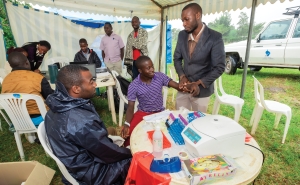From Setback to Resilience
How one graduate student built a strong foundation through the MHS program—paving the way to medical school success.

Tyler Huang, MHS '23
Not getting into medical school on the first try isn’t the end of the road. It can be the beginning of a more prepared journey.
That’s what Tyler Huang, MHS '23, discovered. After facing an initial disappointment in his first application cycle, Tyler enrolled in the Master of Health Science (MHS) program at the Bloomberg School’s Department of Molecular Microbiology and Immunology. Now a second-year medical student at the Chicago Medical School at Rosalind Franklin University, Tyler spoke with current graduate students about his path. The Q&A below is adapted from their discussion, which was moderated by Kari Debbink, PhD, MEd.
Tyler, can you tell us a little bit about yourself and where you are now?
Sure! I'm Tyler Huang, a second-year medical student at the Chicago Medical School at Rosalind Franklin University. I graduated from the MHS program in 2023 and started medical school shortly after. Right now, I’m in the middle of preparing for my Step 1 exam.
How did you prepare for the MCAT, and how much time did you devote to studying?
I took my MCAT the summer between my junior and senior year of undergrad. I basically treated it like a full-time job—studying Monday through Friday, from about 8:30 a.m. to 6 p.m., with breaks. I studied for about three months and took practice exams regularly, especially from Princeton Review. That structure helped me score well.
Did the MHS program at Johns Hopkins help you in your med school applications and interviews?
Definitely. It was a big part of my story. I talked about my thesis, my passion for immunology and pathology, and how those interests motivated me to pursue medicine. It wasn’t the only thing I focused on during interviews, but it added depth to my application and helped show how serious I was.
How well did the MHS program prepare you for medical school?
The immunology course at Hopkins was intense, and I’m really thankful for that. Med school expects you to know a lot, and having that foundation gave me confidence. Immunology comes up all the time—complement cascades, toll receptors—you name it. So yes, it definitely helped.
Med school is stressful—how do you find balance?
Consistency is key. I try to stick to a schedule and set both academic and personal goals. My classmates and I support each other, and our school encourages clubs and community, which helps a lot. I also try to “touch grass” a few times a week—literally! Getting outside and unplugging is important for mental health.
What do you think about the curriculum structure at your med school—classes first, clinicals later?
I like it. I’m someone who prefers to feel prepared going into clinical settings, and covering all the classroom material first helps with that. Plus, we still get some early clinical exposure. By the time I’m on rotations, I’ll have a better foundation.
How many schools did you apply to, and how did that go?
I applied to 34 schools and got interviews at three—UCLA, UC San Diego, and my current school in Chicago, where I was accepted. It really is a numbers game. I chose schools based on location, MCAT ranges, and where I felt I’d be comfortable. Having connections can help too.
Any tips for the medical school interviews? Were they scary?
Interviews varied. San Diego, for instance, had three 20-minute interviews—very conversational. Most interviewers were kind and just wanted to get to know me. They might ask situational questions, but they aren’t trying to trip you up—just seeing how you think.
What clinical experience did you have before applying?
I shadowed a doctor for about two years through a hospital internship program and had lifeguarding and EMT experience before that.
What’s Step 1 studying like compared to MCAT prep?
It’s more intense. The content is broader and more in-depth. I study from about 8:30 a.m. to 7 p.m., then continue after dinner. The questions are more nuanced, and you need to be able to think critically, not just memorize. Thankfully, the school builds in designated study time for us.
What happens if you don’t pass Step 1?
You’re not kicked out, but you do need to pass eventually. Most schools will work with you to give you more time. It’s better to delay the test than to fail.
Final question—do you actually like med school?
I do! It’s crazy and intense, but it’s also super rewarding. I’m excited to get into my clinical rotations and apply everything I’ve been learning. I’m a bit of a nerd, so I enjoy studying the human body. It’s hard work, but I really like it.
Tyler’s journey is a thoughtful reminder that unexpected detours can offer the space to grow, refocus, and arrive at one’s destination better prepared.
Interested in following a similar path? Learn more about the graduate programs in Molecular Microbiology and Immunology.





